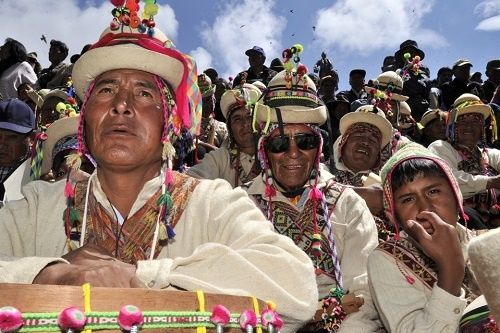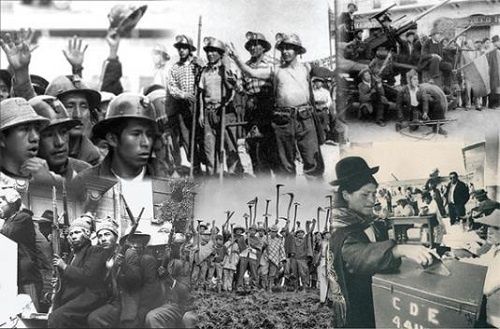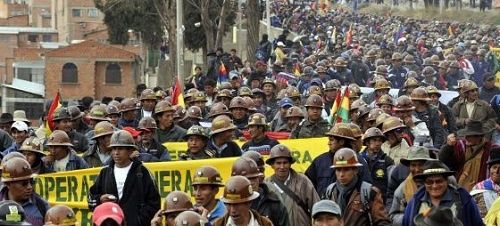For much of Bolivian history, to be indigenous meant being treated as less then human, it also determined your social status and livelihood; if you were born indigenous it meant that you were instantly relegated to bottom of the racial hierarchy.

The Plurinational State of Bolivia, named after Simon Bolivar, is the world’s 28th largest country with a total population of only 10 million people. Of those 10 million people, nearly 42 percent belong to 36 different Indigenous ethnic groups, making it the country with the highest percentage of indigenous peoples in the Western Hemisphere.

Indigenous Aymara people attended national celebrations outside Quemado Palace in La Paz, Bolivia, January 2013. (Photo: AFP)
Despite being the ethnic majority, historically, the indigenous peoples of Bolivia have been subjected to severe cultural, political and economic oppression and have been denied the opportunity to represent themselves.
"Colonialism has turned Bolivia into a self-conscious society, where some people have a superiority complex, and those with brown or black skin have an inferiority complex,” Vice Minister for Decolonization Félix Cárdenas stated. “This reality has allowed for the oppression of one group [Europeans] over others [Lain Americans]."
The issue of ethnic discrimination has been a consistent theme throughout Bolivian history dating back to colonial times. The long period between the 18th and 21st centuries was marked by racialized oppression and exploitation.
National Revolution of 1952
Up until 1952, indigenous peoples were denied the opportunity to vote, own land and learn to read.
However, Bolivia’s National Revolution of 1952, which granted Bolivia’s indigenous population with basic civil rights, was a challenge to some of the most grotesque features of oligarchic racism established in the early 1900s.
Nevertheless, the extension of universal civil rights to indigenous peoples did not translate into the termination of racism.
Instead, the Bolivian government sought to build a society that was more inclusive, but also more homogenous, through the promotion of ‘mestizo’ culture and ethnic assimilation policies.
In response to the cultural homogenization policies carried out during the second half of the 20th century, different indigenous political movements emerged beginning in the 1960s which focused on combating racism and promoting the defense of indigenous rights and identity.

The Evo Morales Era
By the beginning of the 21st century, indigenous peoples had increased their visibility within society.
In 2005, indigenous Congressman Evo Morales won the presidency as part of the Movement Toward Socialism party, or MAS, making him the first Bolivian of indigenous ancestry to be elected president of Bolivia.
Morales’ political discourse, which has been largely based on the need to “decolonize the state” and combat racism, must be seen in the context of Bolivia’s turbulent history of race relations.
The MAS government has aimed to reduce the exclusion of people on ethnic grounds through implementing a variety of legislative proposals.
In 2009, through a national referendum, the country approved a new constitution which renamed the Republic of Bolivia as the Plurinational State of Bolivia, a formulation that emphasized the fact that the country is made up of different ethnicities or ‘nations.’
The constitution recognizes Aymara and Quechua (Bolivia's two most commonly spoken languages after Spanish) as official languages. The document also added the whipala-a symbol of indigenous identity, to the list of national flags, as a gesture of respect for indigenous culture.
The government's integration of indigenous symbols and cultural practices into national legislation formed part of a state-led attempt to construct an inclusive national identity, based on exaltation, rather than the erasing of cultural and ethnic differences.
The Bolivian government took further steps to promote ethnic equality in 2009 when it established a Vice Ministry for Decolonization that helped consolidate public policies to combat racism and helped form an anti-racist network of both state and non-state entities throughout the country.
In efforts to forge an anti-racist legislative agenda, the Vice Ministry passed the Law against Racism and all Forms of Discrimination. This law imposes criminal penalties for public and private institutions and bars media dissemination of racist and biased ideas. It seeks to prevent racism and discrimination through criminalizing racist and discriminatory behavior.
According to Government data for 2014, the statistics on complaints relating to acts of racism and discrimination showed a considerable increase when compared with the period that preceded the enactment of law.
While only 32 complaints of racism and discrimination were handled during the two years prior to the enactment of the law, the General Directorate for Combating Racism received a total of 194 complaints in 2014 alone.
The statistical increase is likely the result of new mechanisms in place for individuals to file legal complaints along with a state-led campaign to promote the use of these institutions among Bolivian citizens.
Finally, additional efforts to combat racism were announced last March 14 with the incorporation of anti-racist educational content into high school curricula.
“The first signs of discrimination can be seen primarily in urban high schools towards students coming from rural provinces or against students with Indigenous physical features or ethnic backgrounds,” Vice Minister for Decolonization Cardenas said.

Aymara people rally on the Day of Decolonization in Bolivia. (Photo: AFP)
This latest educational initiative forms part Bolivia’s ongoing campaign to set up a legal framework to fight against racial discrimination.
Significant progress has been achieved to reverse the deeply embedded practice of racism within Bolivia. However, 500 years of racism cannot be reversed overnight.
Even today, there remains fierce ethnic residential segregation, as well as racially segmented social groups, particularly among high school and university students.
Nevertheless, the Bolivian government has played a key role in promoting ethnic equality and continues to demonstrate the political willingness necessary to ardently address the issue of race relations and racial discrimination.